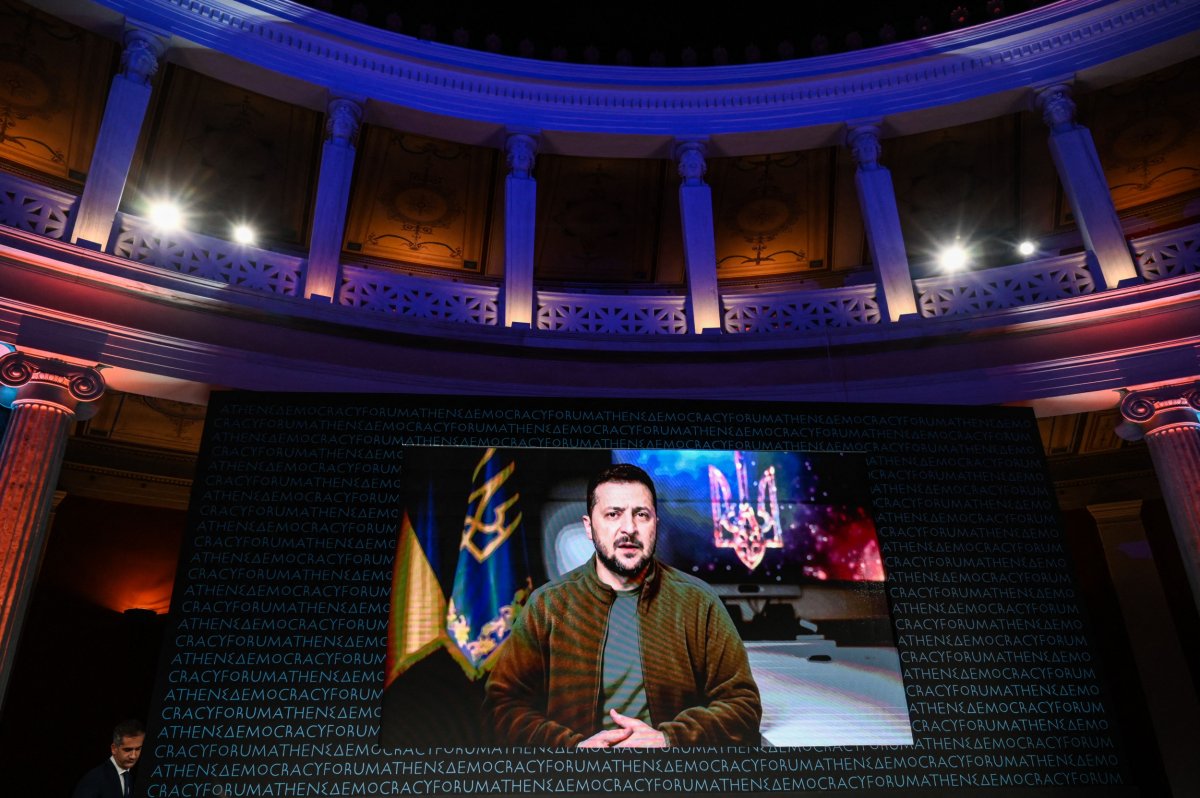Ukraine announced on Friday that it will be signing an application to accelerate its bid to join the North Atlantic Treaty Organization (NATO) after Russia annexed four Ukrainian territories.
"Today, here in Kyiv, in the heart of our country, we are taking a decisive step for the security of the entire community of free nations," Ukrainian President Volodymyr Zelensky said in a translated statement on Friday morning. "Today I held a meeting of the Headquarters of the Supreme Commander-in-Chief. The meeting of the National Security and Defense Council has just ended. We have a decision."
Zelensky continued, "De facto, we have already completed our path to NATO. De facto, we have already proven interoperability with the alliance's standards, they are real for Ukraine—real on the battlefield and in all aspects of our interaction....Today, Ukraine is applying to make it de jure. Under a procedure consistent with our significance for the protection of our entire community. Under an accelerated procedure."
The announcement by Zelensky came shortly after Russian President Vladimir Putin said that he was claiming several regions of Ukraine as part of Russia. In a speech on Friday, Putin said that Russia has gained "four new regions," which include the Luhansk People's Republic, Donetsk People's Republic and both the regions of Kherson and Zaporizhzhia.

Zelensky's announcement in regard to Ukraine's bid to join NATO will put its allies and member countries' relationship with Ukraine to the test.
"To the leaders and citizens from countries who fought so heroically for decolonization and against imperialism, I expect to hear from you tomorrow after Putin tries to annex territory of a former colony and sovereign nation. Silence or neutrality is not a moral option," former U.S. Ambassador to Russia Michael McFaul said in a tweet on Thursday.
To the leaders and citizens from countries who fought so heroically for decolonization and against imperialism, I expect to to hear from you tomorrow after Putin tries to annex territory of a former colony and sovereign nation. Silence or neutrality is not a moral option.
— Michael McFaul (@McFaul) September 30, 2022
Max Bergmann, the director of the Europe Program at the Center for Strategic and International Studies (CSIS), explained to Newsweek on Friday that he sees Ukraine's announcement as "a signal of intent."
"What I think this is, is an important signal to Russia, to Putin, on a day that Putin wanted to dominate the headlines with the annexed Ukrainian territory," Bergmann said. "And the Ukrainians are sending a clear signal that they will never be with you again and I think part of the rationale is to draw attention to where Ukraine's future direction is and that's in Europe, part of the European Union and potentially part of NATO."
Bergmann added that he believes this is a "smart move" by Zelensky but noted that Ukraine's potential membership in NATO "has a long way to go."
"And the reason is not because people don't want Ukraine to be part of NATO," Bergmann said. "I think it's because there is the practical problem that Ukraine is at war with Russia."
Shortly after Russia invaded Ukraine in February, Zelensky called on NATO to impose a no-fly zone over Ukraine. However, NATO's Secretary-General Jens Stoltenberg dismissed the move, noting that doing so could place NATO in a direct war with Russia.
In March, Zelensky spoke to the U.K. Joint Expeditionary Force and acknowledged that Ukraine "will not become a member of NATO."
"We understand this, we are adequate people," Zelensky said in a translated video at the time. "Kyiv needs new formats of interaction with the West and separate security guarantees."
During a press conference on Friday afternoon, Stoltenberg was asked about Zelensky's application to join NATO, to which he responded by saying, "Every democracy in Europe has the right to apply for NATO membership, and NATO allies respect that right and we have stated again and again that NATO's door remains open."
"We support Ukraine's right to choose its own path, to decide what kind of security arrangements it wants to be a part of. Then a decisional membership of course has to be taken by all 30 allies, and we take these decisions by a consensus," Stoltenberg said. "Our focus now is providing immediate support to Ukraine and to help Ukraine defend itself against the Russian brutal invasion."
Regarding Putin's announcement this week, U.S. Secretary of State Antony Blinken said that "the Kremlin's sham referenda are a futile effort to mask what amounts to a further attempt at a land grab in Ukraine."
"The United States does not, and will never, recognize the legitimacy or outcome of these sham referenda or Russia's purported annexation of Ukrainian territory," Blinken said. "This spectacle conducted by Russia's proxies is illegitimate and violates international law."
Newsweek reached out to the Russian foreign ministry for comment.
When reached for comment, a spokesperson for NATO directed Newsweek to the press conference on Friday.
Update 9/30/2022, 2:23 p.m. ET: This story has been updated to include comments from Max Bergmann.
Uncommon Knowledge
Newsweek is committed to challenging conventional wisdom and finding connections in the search for common ground.
Newsweek is committed to challenging conventional wisdom and finding connections in the search for common ground.
About the writer
Matthew Impelli is a Newsweek staff writer based in New York. His focus is reporting social issues and crime. In ... Read more
To read how Newsweek uses AI as a newsroom tool, Click here.








